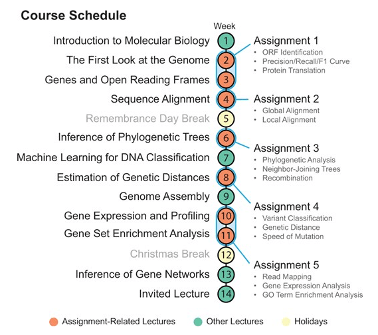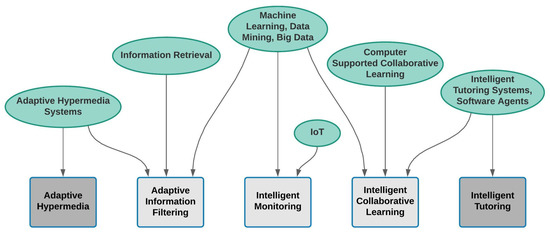4 Simple Techniques For Bioinformatics Tutor
4 Simple Techniques For Bioinformatics Tutor
Blog Article
Not known Details About Bioinformatics Tutor
Table of ContentsEverything about Bioinformatics TutorThe 30-Second Trick For Bioinformatics TutorLittle Known Questions About Bioinformatics Tutor.Indicators on Bioinformatics Tutor You Need To KnowBioinformatics Tutor Can Be Fun For Everyone
Of the total amount participants included in the training, 80% were students from public greater education and learning establishments, while the continuing to be 20% originated from personal institutions. To get a certification of involvement, students were called for to participate in at the very least 90% of the total training hours. As an outcome of this demand, an excellent 95% of the participants efficiently gotten their certificates, having not just satisfied the minimum participation criteria but additionally completed all assigned tasks throughout the training.
Throughout the height of the COVID-19 pandemic, especially between June and August 2020, the task team was charged with arranging specialized training in bioinformatics. This training was especially targeted at students from the study group Center for Research in Applied Computing at the Federal College of Pará (UFRA) The adaptation to remote discovering platforms because of the pandemic developed a chance to discover new mentor methodologies and digital devices that enhanced both reach and efficiency.
To react to the expanding need in the computer and life sciences fields, a sophisticated program was introduced in 2020 titled Introduction to Artificial intelligence. This program was developed to offer an easily accessible yet detailed summary of Artificial Intelligence strategies, specifically as applied in bioinformatics. The program was accomplished over 3 months, from October to December 2020, and was provided completely online through the Google Meet system. This online format made it possible for involvement from students throughout Brazil, numerous of whom might not have had the opportunity to go to in-person sessions.
The Ultimate Guide To Bioinformatics Tutor
Approximately 50% of the overall training hours were committed to practical activities where students built smart designs and applications in an array of clinical domain names, consisting of genes, molecular biology, and environmental data analysis. These platforms made it possible for students to engage in real-time information adjustment, design training, and formula trial and error.
The training course brought in 80 individuals in total amount. Sixty of them were associated with different college organizations in the state of Pará, while the remaining twenty came from institutions situated in 5 various other Brazilian states. This wide geographical depiction highlighted the national interest in bioinformatics and the expanding need for specialized skills around. By presenting Expert system in a relevant and practical context, the campaign offered to bridge the void in between theory and real-world application, providing pupils with a strong foundation for future study or work in the field.
The training campaign formed component of a broader academic outreach initiative referred his comment is here to as the Bioinformatics on the Roadway project. This task has, throughout the years, introduced lots of students to the globe of bioinformatics and computational biology. The events held under this umbrella campaign have taken area across numerous regions and years, as summed up in Table 1 (List of events, places, years, and complete numbers of trainees and teachers)
Numerous of these teams, originally brought together by their involvement in training occasions, have actually given that gone on to generate independent clinical study in cooperation with local academic institutions. The training not only promoted scientific thinking within the context of bioinformatics but likewise stimulated collaborative connections that prolonged beyond the training atmosphere.
The smart Trick of Bioinformatics Tutor That Nobody is Talking About
The job itself was conceptualized and arranged by MB and RR, who looked after the preparation and application of each step. Lectures were supplied by a multidisciplinary team including megabytes, FA, EF, KP, JS, DM, SN, LP, LG, RR, air conditioning, and ih. The very same team, leaving out IH and RR, likewise acted as tutors for the sensible training modules. Financing for the job was provided with the grant 88887.200562/ 2018-00 from CAPES. The writers prolong their thankfulness to everybody that added to the realization of this project, whether straight or indirectly, since its beginning.
The Federal College of Pará's Office of Study (PROPESP/UFPA) also supplied financial support, read the full info here especially for the production of the final manuscript. The writers proclaim no commercial or monetary disputes of passion that can have influenced the research study. In addition, all analyses and point of views shared in this post are solely those of the authors and do not always mirror those of their corresponding establishments, the author, editors, or customers associated with the publication process.

Bioinformatics Tutor for Dummies
From a pedagogical perspective, the teaching approach made use of in the training was purposefully interactive. Courses were carried out in a way that encouraged student engagement and conversation, going past rote memorization to explore how concepts are established, applied in daily life, and tested in scholastic setups. The instructional philosophy concentrated on supporting both strong and struggling pupils, supplying personalized support, and building confidence through sustained mentorship browse around this site and perseverance.

Each group, consisting of approximately 36 individuals, was supported by three mentors-- a lot of whom were postdoctoral scientists with specific competence. These coaches not only aided create the group projects yet additionally facilitated their execution, ensuring that each study concern was both relevant and suitably tough. The objective was to supply a biologically sensible context that individuals could discover with flexible goals and access to curated datasets.
For added understandings into the method and outcomes of this project-based learning technique, visitors are directed to S1 Text, which consists of comprehensive summaries of the pedagogical framework, assessment approaches, and job motifs utilized in the training sessions.
The 10-Minute Rule for Bioinformatics Tutor
Of the total individuals involved in the training, 80% were students from public higher education and learning institutions, while the staying 20% came from private institutions. To qualify for a certification of participation, pupils were called for to attend at least 90% of the overall training hours. Especially, past the pupils who enrolled in the training sessions, 7 skilled teachers participated in providing the programs, while 3 committed study teachers coordinated the general training process. Around 50% of the overall training hours were devoted to functional activities where trainees developed smart designs and applications in a variety of scientific domain names, consisting of genes, molecular biology, and ecological information analysis. The training not only promoted clinical reasoning within the context of bioinformatics however likewise stimulated collaborative relationships that prolonged beyond the training atmosphere.
Report this page